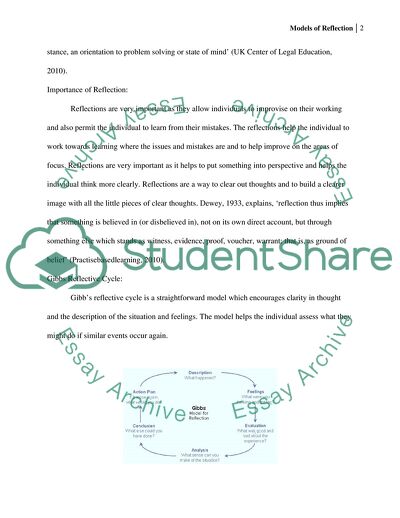
- Home
- Free Samples
- Premium Essays
- Editing Services
- Extra Tools
- Essay Writing Help
- About Us
- Studentshare
- Subjects
- Miscellaneous
- Assignment
Assignment - Essay Example

- Subject: Miscellaneous
- Type: Essay
- Level: Undergraduate
- Pages: 4 (1000 words)
- Downloads: 0
- Author: omarks
Extract of sample "Assignment"
The reflective practice has been explained and has been associated with the learning from experiences and has been regarded as an important part of the learning process and the life – long learning. The process has been noted to be a way to promote the qualified and self motivated professionals and is also a mode of autonomous behaviour of these individuals. Reflection and reflective practice is a mode of self improvement and also a way to improve and build the personal and professional growth and also keep track of both practice as well as theory.
Ohio Union explains, ‘Reflection provides a structured opportunity for individuals and groups to consider the ramifications of the service they provided and better understand their role in the larger community. Reflection also makes a connection between the service you have provided and the broader social issues that are impacting that population or community. It is also a time for personal growth when individuals can look within, by processing the knowledge and skills one acquires through service’ (Ohio Union, 2010).
The UK Center for Legal Education explains the reflective practice as, ‘a set of abilities and skills, to indicate the taking of a critical stance, an orientation to problem solving or state of mind’ (UK Center of Legal Education, 2010). Reflections are very important as they allow individuals to improvise on their working and also permit the individual to learn from their mistakes. The reflections help the individual to work towards learning where the issues and mistakes are and to help improve on the areas of focus.
Reflections are very important as it helps to put something into perspective and helps the individual think more clearly. Reflections are a way to clear out thoughts and to build a clearer image with all the little pieces of clear thoughts. Dewey, 1933, explains, ‘reflection thus implies that something is believed in (or disbelieved in), not
...Download file to see next pages Read MoreCHECK THESE SAMPLES OF Assignment
Dealing With Dilemmas in Business
Salary assignment
Bibliography Assignment
Judiciary Assignment
Astronomy assignment
The Main Motive behind Corporate Reporting

- TERMS & CONDITIONS
- PRIVACY POLICY
- COOKIES POLICY